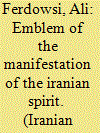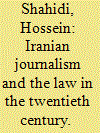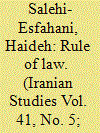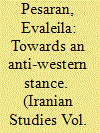|
|
|
Sort Order |
|
|
|
Items / Page
|
|
|
|
|
|
|
| Srl | Item |
| 1 |
ID:
085333


|
|
|
|
|
| Publication |
2008.
|
| Summary/Abstract |
This is a study of the national sacralization of Hafiz as the "emblem of the manifestation of the Iranian spirit." This sacralization began with E. G. Browne in 1902 but reached its definitive formulation in Abd al-Hosein Hazhir's monograph Hafiz-tashrih in 1928. For a nation to have a purchase on itself it must provide for a convocational experience. Shortly after the 1906 Constitutional Revolution, an ascending intellectual elite in Iran set out to do just that by fashioning a heterodox cult of the veneration of Persian poetry by recasting pre-modern texts, authors and their tombs into a national scripture authored by national prophets buried in sacred grounds which culminated in Hafiz as the "seal of its prophets."
|
|
|
|
|
|
|
|
|
|
|
|
|
|
|
|
| 2 |
ID:
085336


|
|
|
|
|
| Publication |
2008.
|
| Summary/Abstract |
Although the first Persian language newspaper was published in Iran 170 years ago, Iranian journalism is a twentieth century creation, indeed a product of the 1906 Constitutional Revolution. The press played a significant part in the revolution, especially by promoting the demand for the rule of laws enacted by parliament, rather than decrees issued by the king or the religious leaders. Once a constitution had been declared, many journalists felt relieved of all restrictions and engaged in bitter, personal attacks on their opponents, including the monarch and his family. Many papers also opposed a press law that was passed soon after the revolution, arguing that it was meant to suppress their newly-gained freedom. Five more press laws have been passed in Iran since then, but the debate over press freedom and the rule of law in the country does not appear to be anywhere near resolution.
|
|
|
|
|
|
|
|
|
|
|
|
|
|
|
|
| 3 |
ID:
085331


|
|
|
|
|
| Publication |
2008.
|
| Summary/Abstract |
The ancient Persian empires are denoted as despotic, practicing arbitrary rule while Greece, Persia's archrival during the sixth to fourth century BC, exercised rule of law. This paper uses a contract theory framework to analyze some of the geographical and environmental underpinnings of the existence of rule of law in the city-states of ancient Greece and its absence in Persia. I discuss the role of geographical conditions of land (open plains versus mountains), population pressure, proximity to the sea and form of trade (overland versus overseas) as factors conducive to rule of law in the city-states of ancient Greece and to despotism in ancient Persia. Specifically, the role of trade via land in Persia prior to the fifth century BC is compared to the role of sea trade (alongside with piracy) in ancient Greece. I argue that in ancient Persia monarchs could tax or expropriate much of the gains from overland trade, preventing the accumulation of an independent form of wealth by merchants. In Greece, sea trade alongside the practice of piracy led to gains from trade that could not be easily expropriated by the monarchs and acted as a balancing force vis- -vis the power of the monarchs, creating a basis for rule of law in the Greek city-states.
|
|
|
|
|
|
|
|
|
|
|
|
|
|
|
|
| 4 |
ID:
085332


|
|
|
|
|
| Publication |
2008.
|
| Summary/Abstract |
Ayatollah Montazeri was a Khomeinist who came to regret being Khomeini's unabashed proteg . Though he has never abandoned the doctrine of velayat-e faqih, he has sought to reconceptualize it by furnishing it with democratic principles. In this, he has not been credible, although he has managed to portray himself as a reformer among some Iranian activists who themselves have credible reformist credentials, such as Akbar Ganji. But other reformists believe that the principles of the mandate of the jurist permit authoritarian abuses. And those among them who seek a mujtahid's support for overthrowing that doctrine would prefer to turn to the writings of Ayatollah Dr. Mehdi Ha'iri (d. 1999).
|
|
|
|
|
|
|
|
|
|
|
|
|
|
|
|
| 5 |
ID:
085334


|
|
|
|
|
| Publication |
2008.
|
| Summary/Abstract |
The Iranian Revolution of 1979 saw the mobilization and cooperation of a variety of groupings that were brought together by their shared determination to overthrow the Shah. However, it was not only opposition to the Pahlavi regime, but also suspicion of and disdain for that regime's Western backers that united these revolutionary groups. Religious leaders (ulama), merchants (bazaaris), intellectuals and students alike all espoused the strong anti-Western sentiments that had been developing in Iran over the previous two decades. But what particular factors can be seen to have encouraged the adoption of these sentiments in the lead-up to the revolution, and in what ways were they articulated and subsequently put into practice by the leaders of the new regime? This article suggests that various domestic and international influences can be seen to have shaped the emergence of Iran's revolutionary discourse of "economic independence." In particular, the paper argues that a peculiar blend of Shi'i concepts of social justice and Marxist-Leninist discourses of class struggle and anti-imperialism not only informed the economic outlook of Iran's burgeoning revolutionary movement during the period 1953-79, but was also enshrined in the Constitution of the Islamic Republic.
|
|
|
|
|
|
|
|
|
|
|
|
|
|
|
|
| 6 |
ID:
085335


|
|
|
|
|
| Publication |
2008.
|
| Summary/Abstract |
The Kurdish novel emerged in 1935 and, towards the end of the twentieth century, established itself as a literary genre with a significant quantity and quality. However, until the last decade of the previous century the Kurdish novel was entirely dominated by Kurdish men and there is no single novel written by a Kurdish woman. During recent years, however, Kurdish women novelists have contributed to the development of this genre. This article aims to assess Kurdish women's novel-writing and, through analyzing and discussing their style and themes, tries to find out their main characteristic generic features. An attempt is made to see if there are thematic and stylistic differences between Kurdish novels written by the women and their male counterparts.
|
|
|
|
|
|
|
|
|
|
|
|
|
|
|
|
|
|
|
|
|